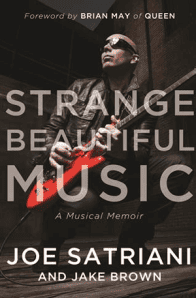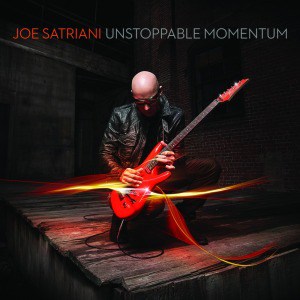Joe Satriani’s Unstoppable Momentum (Interview)
Yesterday, it was announced that Joe Satriani’s Unstoppable Momentum Tour would be coming to New Zealand for two shows in November. Today, The 13th Floor brings you a fresh, new interview with the flamboyant axe-man. Mr Satriani has been a busy man since he was last in New Zealand with his supergroup, G3, featuring Steve Luthaker and Steve Via….playing with Chickenfoot, releasing a new solo album and writing his memoir. The 13th Floor’s Marty Duda spoke to Joe Satriani about the process of looking back over his career and writing about it.
Click here to listen to the interview with Joe Satriani:
Or…read a transcription of the interview here:
MD: You’ve had a book just recently published. Is that correct? Strange Beautiful Music, a memoir.
JS: Yeah, what a trip. Yeah Strange Beautiful Music, a musical memoir. Um, the reason why it’s got that title is mainly because it’s not a straight ahead just autobiography, I spared everyone all the details that are pretty boring and I did a short autobiography in the beginning to let people know where I’m from, how I got started on guitar and then we jumped right into the career and focused on the studio albums. You know, we’ve have 14 studio albums that have been released since ‘85 and so we wanted to basically tell the story behind you know, the creative process, the nuts and bolts and then we interviewed everybody that worked on every record so, it seems like half the book is other people talking about me.
MD: Right.
 JS: Which was very illuminating when I was putting the whole thing together.
JS: Which was very illuminating when I was putting the whole thing together.
MD: What did you learn about yourself?
JS: Well, I learned that I’m crazier than I thought. I’m certainly very driven and a very creative kind of person, you know. Someone who you would hire to do your taxes, somebody you would hire to maybe paint a mural on your wall or write some music for you and that I suppose what the biggest revelation was that, you know I did in fact bring, you know everything that was going on in my life into each of the records and you know I thought maybe I was being very professional, I’d show up and stick to the music but everybody knew everything that was going on and you know we all walk the earth the same way and things happen to all of us. It just so happens that I’m making records while that stuffs happening.
MD: Right.
JS: So um, that was something that was, it was a cathartic process actually to write a book, to compile all those interviews and to come to grips with those things I so cleverly forgot.
MD: Was there any trepidation in the thought of going back and especially hearing other people’s point of view about you know, things that have happened in the distant past.
JS: Yeah, you’re right about that I mean, I think it was more like totally fear actually rather than trepidation. You know, it’s like I’m one of those guys who likes to keep moving forward, certainly for writing music, it helps us keep moving forward like after you make a record you know, you can’t make people like it so they decide if they’re gonna like it or not, then you get busy with the next one and keep moving forward. Um, but here I have to really go back with these records and I had to really confront what everybody had to say that they had, maybe not told me for all these years and so yeah there were a couple of weeks where I was heavily involved in finishing up the book and I thought wow it’s just like, you know, it’s like having a funny emotional cloud following you around, you know your thoughts are deep in the past about certain conflicts and you start thinking ‘oh I could have done that better or I could have handled that situation better. But um, in the end I think everybody shines in the book and it’s just so much interesting stuff in there.
MD: Alright. And looking at it from a musical point of view, did you, going over your past like that cause you to go back and think ‘oh I haven’t done this yet or I really enjoyed this and I’d like to do some more of that musically’.
JS: Well one thing that did teach me was that even though it caused a lot of pain now and then striking out in a new direction always paid off in the end. I think that maybe, you know, as an artist you feel like there were more barriers around you than there really are and there’s always gonna be somebody out there that says to you, oh why don’t you play and look and sound the way you used to but most people are saying what have you done lately that’s different. You know, everybody’s moving forward on the planet in the same way, none of us can control time and you gain a new audience, I think with every record and when you stick around long enough then it becomes a quite an unusual tapestry of fans. One thing that can illustrate this is the fact that, you know, I went from the first couple of records that got me discovered around the world and then every three or four records I’d make something totally different like the eponymous release in ‘95, which was very bluesy and down to earth and then this sort of trance/techno record in 2000 called Engines Of Creation. These records were in some way polarising for older fans, but actually it was an equal amount of fans that said ‘oh finally I can listen to this guy’.
MD: Right.
JS: You know, because I finally played something like the music they were into.
MD: Right, right.
JS: Maybe their age group or something and you know, other people always ask me oh you should sing some more and equal amounts say, whatever you do, please don’t sing anymore. It’s better just to keep doing what you wanna do and let people think the way they like to think.
 MD: And I’m assuming the book was in progress while you were recording or thinking about recording Unstoppable Momentum, so did any of the fall-out from making the book come into the making of that album?
MD: And I’m assuming the book was in progress while you were recording or thinking about recording Unstoppable Momentum, so did any of the fall-out from making the book come into the making of that album?
JS: Well what was interesting was that the interviews for, regarding people who were part of my earlier group of musicians, their interviews had already been done before the end of that tour and prior to the beginning of the Unstoppable sessions and so once we got into the Unstoppable part, it was really more just about me working on the book because by then our publisher had asked me to turn the book into a first person narrative. So I had to go over all the interviews and try to come with a style, a writing style for the book and my writer Jake Brown who really was instrumental in crystallising the idea for the book, you know, focusing on the studio albums, was just a fantastic help because I’d never written a book before and so he guided me to the process of you know, how we were gonna do this. And of course he had conducted all of the interviews with everybody and so it was very interesting to work but yeah one of the fall-outs is you know, that when suddenly I mentioned to Jeff, hey I’m gonna be using a different drummer on the record, he got pretty upset, he hasn’t spoken to me since but we already had his input for the book so you know.
MD: Oh that’s good.
JS: He didn’t get a chance to rant and rave about me, so good fortune there.
MD: One quick thing I wanted to touch on before we go. When I spoke to you last, you mentioned both Jack White and Jimmy Page as being people you respected as artists. They both, I think Jack White’s got a new album coming out in about a week or so and then these Led Zeppelin reissues are happening. Is that something that you look forward to, will you be checking those out and listening for stuff as a fan?
JS: Yes, yeah. I’ve got the single so we’re just waiting for Jack’s album to drop. Yeah you know, I’m a sucker for Led Zeppelin stuff so every time Jimmy manages to come up with a better sounding set of masters, you know, I’m in line with everybody else because yeah the old stuff wears out and it actually, technology has been moving forward and we have the benefit now of being able to hear the stuff even better so I’m all for it.
MD: Right, and of course there’s still a few unreleased or remixed things that are coming out as well I guess so. It should keep things interesting.
JS: Yeah we do. We went through the same process you know, it was really by coincidence that Sony Legacy approached me about doing a box set and then we came up with the whole idea of putting the entire high resolution media file into a chrome head you know.
MD: Right, that’s right yeah.
JS: Yeah, but we went through the same process and I understand, you know, completely that, just like Jimmy Page you know, you go back in a 2014 we have the ability to actually re-master the old records and make them sound you know, 50% better than they used to sound.
MD: Yeah.
JS: You should do that.
MD: Excellent. Alright. Well I guess we should just briefly touch on what folks can expect when you get here at the end of the year, you and your band. You’re going into rehearsal now. How do you approach the second leg of the tour?
JS: Well, we’ll get together next week and hopefully we will remember everything.
MD: Right, that’s always good.
JS: But I think we’re just gonna jump right in and it’s an interesting set of gigs. We have a show in my home town, on Long Island in New York where I used to go, a theatre that used to be just a regular family movie theatre. I used to go there when I was a little kid, like 5 years old and go see movies and then they turned it into a venue. So we’re gonna play there, kind of celebrate the box set and the book.
MD: Right.
JS: And then two nights later we’re playing at the Aredian Club to celebrate Les Paul’s 99th birthday.
MD: Oh my god.
JS: It would have been his 99th birthday. We do one other show in Connecticut and those are kind a like a warm-up shows. The show at the Aredian is gonna be filmed for a PBS television special, which is great so we have to be good that night.
MD: Yup.
JS: And then we’re off to Europe and we’ll spend two months in Europe hitting all the cities and countries that we didn’t get to last year.
Click here for details about Joe Satriani’s 2014 New Zealand tour.
- Civil War – Dir: Alex Garland (Film Review) - April 9, 2024
- Pearl Jam – Dark Matter (Monkeywrench/Republic) Album Review - April 1, 2024
- Blonde Redhead – New Zealand Tour 2024 - March 14, 2024
